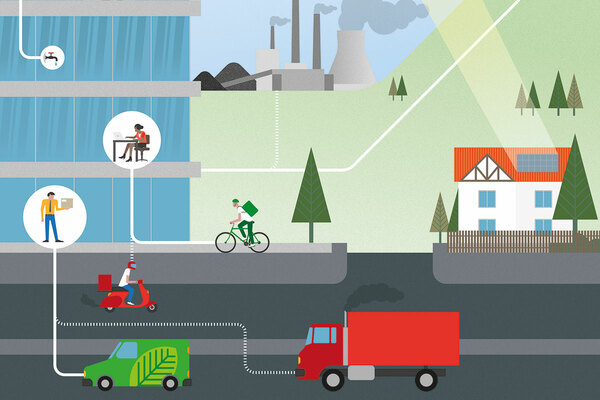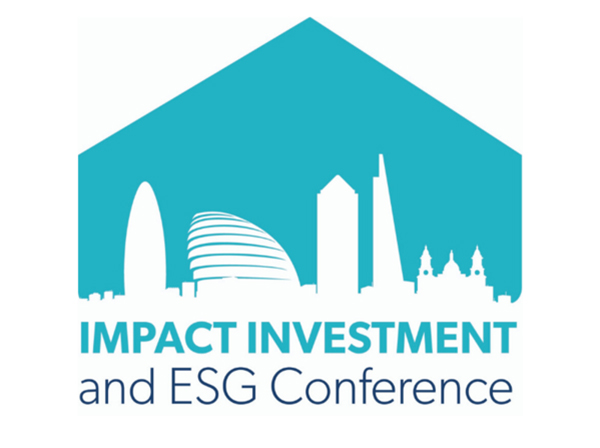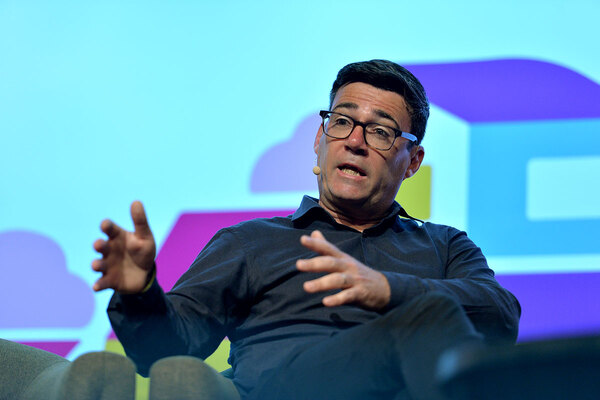You are viewing 1 of your 1 free articles
How the sector is embracing sustainable loans
Social landlords are getting involved in a new type of financial product: loans that give them better terms if they meet sustainability targets. But why are these appealing and what makes them sustainable? Rhiannon Curry investigates. Pictures: Getty
Housing associations increasingly rely on private sources of finance to fund their day-to-day activities, as organisations learn to live in a world with less government funding.
But a new type of loan has emerged in recent months. Several social landlords have agreed deals with financial institutions in which the interest on the loan is directly linked to certain outcomes.
These are sustainable or social, and the more targets the housing association meets, the better the loan’s terms.
But why embark on this type of financing? What is in it for the housing associations, particularly if the goals set often already fall within their charitable and social remit? And why are banks keen to agree to these sorts of terms?
Tom Paul, director of treasury and commercial at 45,000-home Optivo, which agreed a sustainability-linked loan last year, says the deals were “win-win”.
“For the bank, it helps them to demonstrate their environmental, social and governance [ESG] credentials, while ultimately for us, it means delivering value we can invest back into the business.”
He adds: “I think it appeals to some banks because it is based on results.”
Optivo’s deal was made with First Abu Dhabi Bank, which lent it £50m, and French bank BNP Paribas, which also lent £50m. The landlord will get a lower rate if it gets more than 1,000 of its residents into work and training during the year.
“It’s partly the discipline of having to think about and demonstrate that we are doing these sorts of things”
(Optivo’s 2018/19 annual review said the association had supported 1,122 people into jobs and training that year.)
But how far do these ambitions really go? Most companies, including housing associations and banks, face pressure from stakeholders to be doing more in terms of sustainable outcomes.
So are loans like this just ‘greenwashing’?
Mr Paul rejects the idea that Optivo should be seeking to get tenants into work anyway and says the extra investment has made a difference.
“It’s partly the discipline of having to think about and demonstrate that we are doing these sorts of things,” he says. “[The amount of money] is not going to change the world but in the context of us getting more people into work, it’s significant.”
He points out that the housing association must first make the outlay needed to get people into work before it can reap any of the rewards.
It is a similar story from L&Q: it became the first housing association to agree this type of loan when it signed a £100m deal with BNP Paribas in June 2018.
At the time, Simon Gates, UK head of corporate coverage and transaction banking at BNP Paribas, called the deal “a watershed moment”.
The previous year, the bank had announced a new corporate social responsibility policy, designed to create a positive impact in society. By extending loans to corporates and developing sustainable investment products, it aims to demonstrate that it contributes to the United Nations’ Sustainable Development Goals, it said.
The loan to L&Q was signed at a discount rate on the condition that the housing association helped at least 600 of its residents into work. Neither has divulged how big the discount is, but it did free up more money for the housing association to invest in its foundation arm.
“Yes, we already had employment support programmes running, but the deal with BNPP incentivised us to stretch our targets”
Like all the organisations Inside Housing spoke to, L&Q refuted the idea that the loans were being agreed with targets that it should be seeking to achieve anyway.
“In terms of the positive incentive loan we signed with BNP Paribas (BNPP), we absolutely signed up to ‘stretch targets’ to secure the loan,” a spokesperson for L&Q says.
“Yes, we already had employment support programmes running, but the deal with BNPP incentivised us to stretch our targets to get 600 residents into work in year one to secure a discount on our loan. This rises by an additional 25 residents in each subsequent year.”
L&Q already had a target of getting 600 people into work every year, which was mentioned in its 2017/18 annual report – it almost got there that year, with 572 people helped into employment. The association explains that the funding locks L&Q into year-on-year improvements.
“If we diverted resources to other activities and missed the employment targets over the long term, we would be penalised,” a spokesperson notes.
He added that the company would “certainly disagree with any suggestion that these types of loans are ‘greenwashing’” and said that the loan “incorporates a very clear and concrete positive impact metric”.
For Clarion Housing Group, its ability to secure a funding deal with sustainability-linked terms signalled that its commitment to doing things better was something that financial institutions valued.
Gareth Francis, director of treasury and corporate finance at the group, says: “Our recent landmark bond issue signalled a vote of confidence from investors and reinforced our belief that a commitment to sustainability will attract new funding sources.”
Principles of sustainable loans
Sustainable investment started in the 1970s, as a way of ensuring investors did not put their money into certain stocks and shares. Since then, the concept has grown to cover all sorts of financial products.
The total global market for green and sustainability-linked loans has grown incredibly quickly, from $5bn in 2017 to around $100bn in 2019, according to Bloomberg data.
There are several guidelines about how these products should be designed, such as the sustainability loan guidelines used by Clarion to structure its bond. The Loan Market Association’s ‘Sustainability Linked Loan Principles’ defines this type of investment as any loans that “incentivise the borrower’s achievement of ambitious, predetermined sustainability performance objectives”.
The housing association agreed a £100m revolving credit facility with Japan’s Sumitomo Mitsui Banking Corporation in December. Clarion will pay a lower interest rate on the loan if it delivers on targets to support an agreed number of people into work each year through its training and support programmes.
Clarion has not disclosed the exact terms of the loan, but says it followed the International Capital Market Association’s sustainability bond guidelines.
“Over time the market will increasingly allocate capital to organisations doing social good”
“We don’t borrow money to get people into work, we borrow money to build new homes,” he notes.
However, he argues that this sort of bond or loan has an overall benefit for society, not only linked to the specific outcome measured in the bond but in that “over time the market will increasingly allocate capital to organisations doing social good”.
Mr Francis says the motivation is about “demonstrating what we’re doing”, adding to the company’s already ambitious sustainability targets.
“All this builds on our existing strategy, which is to build a responsible business, to build housing for people in need and to help people’s lot in life, whether that is through employment or digital inclusion or money advice,” he says.
There is also the potential to meet green targets through these loans: in January, Bromford, which owns or manages 43,000 homes across the Midlands and the South West, agreed a £50m revolving credit facility with NatWest.
The loan has an ESG wrapper, with the margin on the loan decreasing if Bromford successfully meets targets related to the energy efficiency of its existing homes.
“The driver [for the banks] doesn’t need to be additionality – it is just smart investing in a growing market”
So is this something we’re likely to see more of in the future? Ian Simm, founder and chief executive of global investment management company Impax Asset Management, which focuses on sustainable investment, says he thinks this sort of lending is “a bit of an experiment”.
“It is quite compelling from a societal perspective to try to nudge those who are pulling the strings in that area [social improvement and sustainability], and a good way to do that is through a performance incentive.”
He says additionality – in which an investment has an impact only if it increases the quantity or quality of the social outcomes beyond what would otherwise have occurred – is not necessarily important.
“The driver [for the banks] doesn’t need to be additionality – it is just smart investing in a growing market,” he says.
But he says that a policy nudge, such as incentivising energy efficiency by offering organisations a share of the savings, might ultimately prove more effective.
Housing associations will continue to have conversations about their wider social aims with their lenders as they build relationships, says Optivo’s Mr Paul.
“[Sustainability-linked lending] will work for some banks and not others. For those it does work for, I can well imagine it would become part of their business. If you’ve got three loans, why not have four? You can imagine a bank building a whole portfolio of these types of loans.”
Housing associations are rightly enthusiastic about the opportunity this type of borrowing brings them to leverage extra money for their social activities – which is nothing to be sniffed at in the current climate.
Impact Investment and ESG Conference
Impact investment is a multitrillion-pound global market.
With an increasing number of entrants attracted to the ‘social’ in social and affordable housing, this new conference will look at the opportunities and risks in this market, and what it might mean for UK housing and future funding sources and partners.
Programme highlights include:
- Global overview: defining the spectrum of capital; learning from other sectors
- Widening the pool: what ESG labels can bring to housing association bond issuers; the UK story so far
- Equity capital: new models for balancing risk and reward in affordable housing
- Approaches to measuring social value and making the financial case
- Government policy and the regulator’s view
The Impact Investment and ESG event will take place on 15 October 2020 at 133 Houndsditch, London, and while tickets are not available to purchase yet, you can let us know if you’re interested in attending next year by completing this form:












